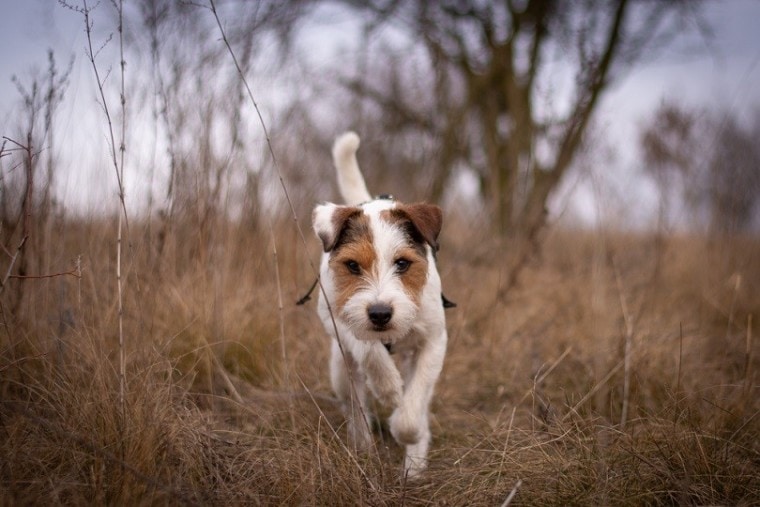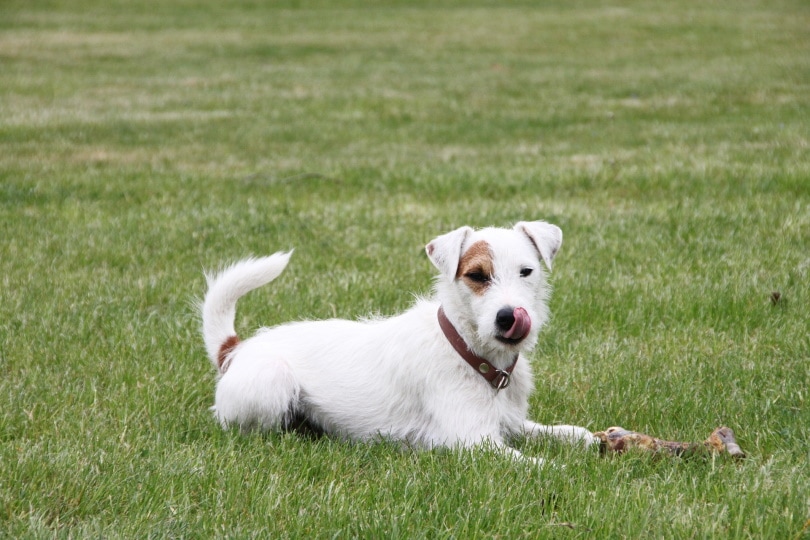
Click Below to Skip Ahead
In England during the 1800s, when foxhunts were a common pastime, a man called John Parson Russell wanted a dog breed to keep up with the traditional English Foxhounds, with the added benefit of following foxes into their burrows to chase them out. The Parson Russell Terrier is the culmination of his efforts.
After Russell died in 1883, Arthur Heinemann established the first breed standard in 1904. Heinemann sought to meet the vision set by Russell and founded the Parson Jack Russell Terrier Club in England to acknowledge both Parson Russell Terriers and the more common Jack Russell name that was used for all small working terriers.
Breed Overview
Height:
13–15 inches
Weight:
13–17 pounds
Lifespan:
13–15 years
Colors:
Solid white or white with black, brown, tan, or tri-color markings
Suitable for:
Active families, homes with a yard, experienced dog owners
Temperament:
Loyal and loving, intelligent, friendly, gets along with other dogs, energetic, happy
Parson Russell Terriers are full of energy, require plenty of exercise, and get along well with other dogs. They make great companions for active families, especially those familiar with dog ownership. This small, intelligent, breed has a rich history and is highly debated among breed enthusiasts.
To help clear up some of the confusion, especially in regard to the similar — but not identical — Jack Russell Terrier, we put together this guide to introduce you to this AKC-recognized breed.
Parson Russell Terrier Characteristics
Parson Russell Terrier Puppies

Parson Russell Terriers are not for the faint-hearted. Unlike other small dog breeds who fit well into apartment life, Terriers are better suited to houses with a yard that they can play in. It’s important to remember these dogs were initially bred to hunt foxes alongside foxhounds and horses. They’re highly energetic, quick, relentless, and get bored easily.
Active families who are familiar with dog ownership are the best match for these terriers. Their loyalty makes them an adoring companion, but their willful stubbornness can be challenging for the inexperienced to handle.
Temperament & Intelligence of the Parson Russell Terrier
Besides their hunting drive and energy, Parson Russell Terriers are fun companions for the family. They’ll play all day long and cuddle with you on the couch before starting all over again with a tenacious desire to amuse themselves and you with their antics.

Are These Dogs Good for Families? 👪
This breed is loving and friendly, with boundless levels of enthusiasm. They match well with older children, provided that they’re properly socialized and the children themselves are taught to respect and play nicely with their puppy.
Parson Russell Terriers aren’t inherently aggressive, but they do snap and growl when they feel threatened. Smaller children who play too roughly may earn a growl or two, but otherwise, this breed is content to spend time with families of all ages.
Families familiar with dog ownership will find the breed easier to deal with than newbies to the dog world. These terriers can be stubborn and independent, requiring a positive but firm position of leadership from their human pack mates.
Does This Breed Get Along With Other Pets?
Foxhunts were packed with both horses and dogs, along with their human handlers. For this reason, Parson Russell Terriers were bred to be excellent hunters with a healthy respect for their canine coworkers.
While it’s not recommended to let your terrier play with your rabbit or guinea pig, they’ll get along well with pets larger than them. Other dogs are a good match for this breed.
Things to Know When Owning a Parson Russell Terrier
Parson Russell Terriers aren’t recommended for new dog owners, and their care can be challenging even for the experienced, especially people who aren’t familiar with handling stubborn dog breeds. If you’re planning on buying a Parson Russell Terrier, the following will help you properly prepare for your new family member.
Food & Diet Requirements 🦴
Two meals a day for adults and three for puppies under 6 months is the recommended feeding routine for Parson Russell Terriers. Both commercial and homemade food, provided that they’re high quality, will keep the breed healthy and their diet balanced.
Healthy treats can also help with training a Parson Russell Terrier. Remember to balance their intake of snacks with their meals to ensure that you don’t overfeed them.
Exercise 🐕
Although their small size makes these dogs appear to be the perfect match for apartment living, their energy level makes smaller homes too constricting. They do best with active families, a large yard, and a run or several walks a day. Boredom can also lead to unwanted behavior like grouchiness, destruction, and relentless barking.
To keep your Parson Russell Terrier entertained, let them put their noses to the test in your local woodland or take them on your morning run. Remember to keep them on a leash, though, as their prey drive will often convince them to race off to chase squirrels, the neighbor’s cat, or smaller canines.
Training 🎾
Parson Russell Terriers are both intelligent and stubborn. With their sheer level of energy, they make great partners for canine sports, whether you place them in agility, speed, or intelligence competitions.
The downside, however, is that they are easy to bore and are highly independent. They don’t appreciate mishandling and will growl when they feel slighted. If you don’t convey a strong enough presence as a leader, they won’t hesitate before walking all over you and ignoring any commands that you want to give them.
Proper socialization is also key here. While the breed is naturally friendly, familiarity with children and other animals will help them settle into your home better.
In light of their stubborn independence, the Parson Russell Terrier needs an owner who is familiar with dogs and is consistent but also positive and fun. Matching the breed’s boundless energy will help you train your puppy to excel at various sports, stay quiet when you need them to, and better control their desire for trouble.
Grooming ✂️
Keeping your Parson Russell Terrier looking good is, fortunately, much easier than tiring out these energetic pups. They have two types of coats. Smooth fur can be taken care of simply by using a grooming mitt or with a thick brush, while rough or broken coats take a little more tending. Along with a pin brush, it’s a good idea to pluck or clip rougher coats to prevent matting.
Although the Parson Russell Terrier isn’t hypoallergenic, they don’t shed much They still require regular brushing sessions, though, either at home or with a professional groomer.
Don’t forget your puppy’s other hygiene needs. Bathing once a month or when needed is recommended, and you should check their ears as often as possible. Dirt can get trapped under their floppy ears and lead to infection. You should keep their nails clipped at least once a week too.
Health and Conditions 🏥
Like other dog breeds, the Parson Russell Terrier is susceptible to several health issues. Check with your breeder to make sure they screen their stock for common illnesses and do regular ophthalmologist and BAER tests. Reputable breeders will be more than happy to supply up-to-date medical records for both the parents and the puppies.
Male vs. Female
The Parson Russell Terrier is known for their high energy levels, and the biggest difference between the sexes is their differing activity requirements. While there isn’t a massive variance, male Parson Russell Terriers tend to be the more active of the breed, while females are more laidback.
Female terriers are more assertive, however. They might be more reserved, but they are also more independent and stubborn when it comes to training. Where a male puppy will be happier to please, your female terrier will challenge your authority.
No matter the sex of your Parson Russell Terrier, however, they’ll be full of life and will happily run rings around you if you let them. Above all, stay positive and consistent with your training methods, while remembering that your dog is an individual.
3 Little-Known Facts About the Parson Russell Terrier
This breed has been around since the 1800s, and as a result, they have a rich history filled with debate and interesting information. From their origin story to their rise in popularity, here are a few interesting facts about Parson Russell Terriers.
1. The Difference Between Parson Russell Terriers and Jack Russell Terriers Is Widely Debated
Parson Russell Terriers are the official, AKC-recognized standard. Many dog lovers see them as identical to Jack Russell Terriers, being the same size and color. Other breed enthusiasts believe that they’re both separate breeds and should be acknowledged as such.
This debate stems from their origin story. While Parson Russell Terriers were initially bred by John Parson Russell, Jack Russell Terriers was a name given to cover both small terriers and hounds. As a title given to all working dogs of a certain size, Jack Russell Terriers is the more familiar name.
Before 2003, the AKC originally listed Parson Russell Terriers as Jack Russell Terriers before changing the name to acknowledge Russell’s involvement in the initial breeding program. These days, despite the differences and the ongoing debate, the names are generally interchangeable.
2. Parson Russell Terriers Are Team Players
To work with people, horses, and foxhounds, Parson Russell Terriers were bred to be friendly and loyal teammates. While their high prey drive keeps them chasing after smaller animals, aggressive tendencies toward their pack mates were mostly bred out of their bloodline.
3. They’re Fearless and Energetic
Despite their unassuming stature, Parson Russell Terriers give even the most active families a run for their money. They’re playful and fast, and their boundless energy can lead to long play sessions and noisy afternoons.
This breed more than makes up for their small size with their fierce determination and willingness to get into all kinds of mischief.
 Final Thoughts
Final Thoughts
Best suited for active families with plenty of space to run around, the Parson Russell Terrier is an energetic, happy companion with a nose for mischief. They can be stubborn and willful but are also highly intelligent and make great show dogs for agility and speed competitions.
Originally bred to join foxhunts, Parson Russell Terriers work well with larger dogs, chase smaller animals with relentless determination, and require a firm, steady leader to show them how to behave appropriately. While they’re not recommended for quieter families or inexperienced dog owners, they’re loyal to a fault with the people whom they choose as their own.
Featured Image Credit: Kristyna Mrazkova, Shutterstock






